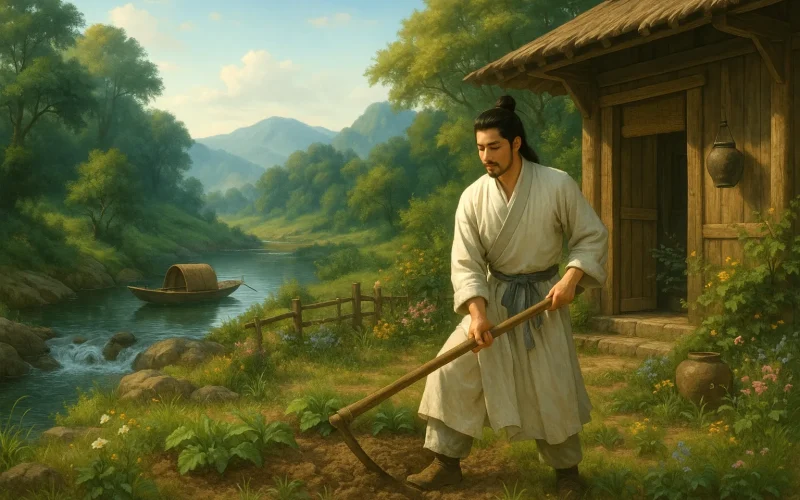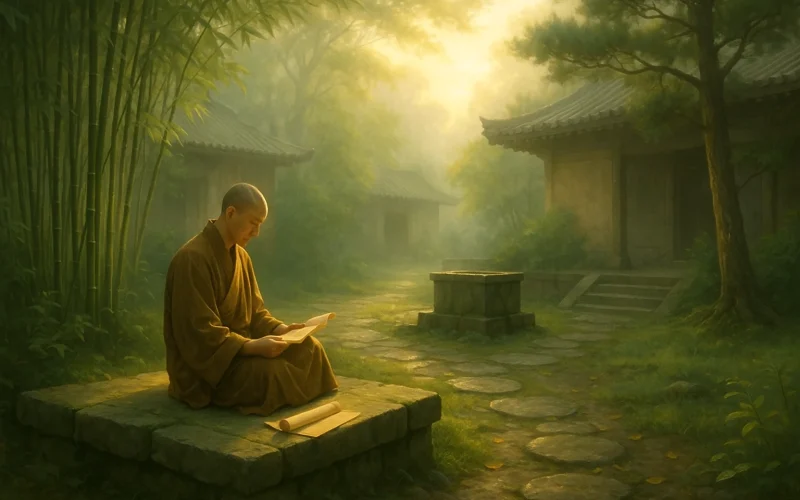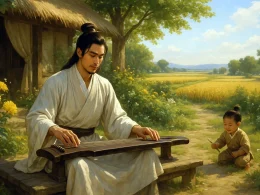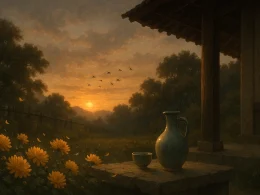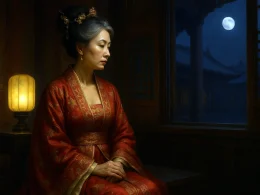I had so long been troubled by official hat and robe
That I am glad to be an exile here in this wild southland.
I am a neighbour now of planters and reapers.
I am a guest of the mountains and woods.
I plough in the morning, turning dewy grasses,
And at evening tie my fisher-boat, breaking the quiet stream.
Back and forth I go, scarcely meeting anyone,
And sing a long poem and gaze at the blue sky.
Original Poem
「溪居」
柳宗元
久为簪组累,幸此南夷谪。
闲依农圃邻,偶似山林客。
晓耕翻露草,夜榜响溪石。
来往不逢人,长歌楚天碧。
Interpretation
Written in 810 AD during Emperor Xianzong's Yuanhe era, this poem dates from Liu Zongyuan's exile as Sima of Yongzhou following the failed Wang Shuwen reforms. Discovering the secluded beauty of Ranxi (which he renamed "Fool's Stream"), Liu composed multiple "Fool's Stream" poems, including this work titled "Streamside Dwelling," reflecting his life in this self-chosen retreat.
First Couplet: "久为簪组累,幸此南夷谪。"
Jiǔ wèi zān zǔ lèi, xìng cǐ nán yí zhé.
Long burdened by officialdom's chains / "Fortunate" this southern exile remains
The opening deploys bitter irony—"fortunate" (幸) in quotation marks—to mask political disillusionment. "Burdened" (累) confesses bureaucratic weariness, while the forced cheer of exile's "fortune" barely conceals helpless resignation towards court politics.
Second Couplet: "闲依农圃邻,偶似山林客。"
Xián yī nóng pǔ lín, ǒu shì shānlín kè.
Leisurely leaning on farmstead borders / Sometimes seeming a mountain wanderer
Rural domesticity brings provisional solace, but "sometimes seeming" (偶似) admits this is performance rather than true reclusion—a scholar's pantomime of peasant simplicity that cannot erase his intellectual identity.
Third Couplet: "晓耕翻露草,夜榜响溪石。"
Xiǎo gēng fān lù cǎo, yè bǎng xiǎng xī shí.
Dawn hoeing through dew-heavy grass / Night boating where rocks clang as we pass
Agricultural labor and nocturnal excursions structure exile's empty days. The onomatopoeic "clang" (响) of boat against stone becomes the poem's sole sharp sound in muted solitude—both activity marker and emotional punctuation.
Fourth Couplet: "来往不逢人,长歌楚天碧。"
Lái wǎng bù féng rén, cháng gē Chǔ tiān bì.
Coming, going—meeting none / Singing long to Chu's blue dome alone
The climax moves from horizontal isolation ("meeting none") to vertical communion with the sky. "Singing long" (长歌) suggests both emotional release and existential cry, the vast "blue dome" (楚天碧) amplifying individual insignificance against cosmic indifference.
Holistic Appreciation
This apparently serene pastoral poem conceals profound melancholy beneath its surface. Liu constructs a double narrative: the literal account of streamside activities (farming, boating) and a submerged lament of political exile. The tension between performed contentment ("fortunate exile") and actual loneliness ("singing alone") creates poignant irony. What begins as bureaucratic relief evolves into meditations on human connection and nature's impassive beauty.
Artistic Merits
- Layered Irony: Surface gratitude masks deep disillusionment
- Sonic Texture: Contrasts agricultural quiet with solitary boat echoes
- Perspectival Shift: Narrow farm views expand to celestial vastness
- Emotional Restraint: Communicates isolation through absence ("meeting none")
Insights
Liu's poem speaks to modern experiences of professional failure and self-reinvention. His streamside "performance" of rural contentment mirrors contemporary tendencies to aestheticize life crises on social media. The work ultimately suggests that true resilience isn't found in pretending exile is "fortunate," but in creating meaning through artistic expression—turning isolation's "blue dome" into a canvas for the singing self.
Poem translator
Kiang Kanghu
About the poet

Liu Zongyuan (柳宗元), 773 - 819 A.D., a native of Yongji, Shanxi, was a progressive thinker, brilliant writer, and revolutionary statesman of the Tang Dynasty. Nineteen years before he was born, the An Shi Rebellion broke out, which dramatically changed the Tang Dynasty from prosperity to decline. The subsequent failure of the Yongzhen Reform was a historical tragedy that cut short Liu Zongyuan's political future, but made him one of the leading thinkers and literary figures of the Tang Dynasty.





